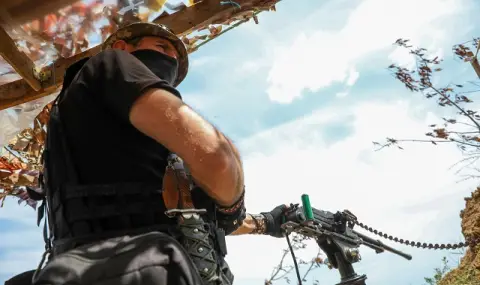< p>Russian forces launched counterattacks along the western edge of Kursk Oblast and reportedly captured several villages northeast and south of Korenevo on September 10 and 11. Footage released on September 11 shows that Russian forces have regained positions east of Zhuravli (northeast of Korenevo).
The size, scale and potential outlook are unclear and it is too early to draw conclusions, the Institute for the Study of War (ISW) wrote.
Russian bloggers claim that Russian forces launched the mechanized counterattack from the north near Korenevo and that they quickly advanced into Snagost. Several Russian sources even claim that it has already been captured.
ISW has not seen confirmation of these claims and will continue to monitor the situation.
The Russian army can rely on relatively combat-experienced units to conduct assault operations in the Kursk region, although it is unclear how effective these operations will be, as these units are heavily degraded and rebuilt many times, such as the 155th naval infantry brigade.
It is also unclear whether Russian forces have sufficient forces to fully repel Ukrainian forces or defend against Ukrainian counterattacks in Kursk Oblast. The Russian military command probably only deployed elements of the military units.
Russian forces may intend to temporarily isolate the Ukrainian breakthrough in Kursk Oblast before launching a more organized and well-equipped effort to push Ukrainian forces out of Russian territory. Russian forces are currently conducting counterattacks along the western edge of the Ukrainian salient in Kursk Oblast, an area largely made up of fields and small settlements. Russian forces may work to establish more tactically advantageous positions during these initial counterattacks before launching a broader counteroffensive operation against Ukrainian forces operating northeast of Korenevo and near Suja.
Russian forces may intend to advance to the international border southeast of Snagost to complicate existing Ukrainian logistics routes and fire support positions closer to the international border before launching a larger counteroffensive operation.
ISW will continue to assess the impact of Russian counterattacks in the coming days.
US Secretary of State Anthony Blinken and UK Foreign Secretary David Lammy arrived in Kyiv on September 11. They reiterated their support for Ukraine, but did not clarify current Western policy on Ukraine's ability to strike military sites in Russia with weapons provided by the West.
Ukrainian Prime Minister Denis Shmygal met with Lamy on 11 September and stressed that Ukraine was still waiting for permission from the UK to use UK-supplied long-range weapons to strike military sites in Russia.
Biden said on Sept. 10 that his administration was "working it out" when asked about potential plans to lift U.S. restrictions on Ukraine's use of long-range weapons in Russia.
China continues to tout its alternative peace plan for the war in Ukraine. Foreign Minister Wang Yi met with Russian Security Council Secretary Sergei Shoigu in St. Petersburg on September 11. Beijing will continue to promote its own vision of ending Russia's war in Ukraine and seek to persuade other countries to support peace in the PRC plan.
During the meeting, Shoigu confirmed Russia's support for the joint peace plan between China and Brazil.
PRC officials routinely tout the PRC-Brazil peace plan and allow Russian officials to portray themselves as willing to negotiate with Ukraine in good faith, despite consistent Kremlin statements that outright reject negotiations or otherwise indicate that Russia will negotiate only under conditions that mean the complete capitulation of Ukraine.
Turkish President Recep Erdogan reiterated his support for Ukraine on September 11. Erdogan delivered a virtual speech at the Fourth Summit of the International Crimea Platform on September 11, in which he emphasized his support for Ukraine's territorial sovereignty, independence and autonomy. He stated that Crimea should be returned to Ukraine according to international law.
Two anonymous US officials told CNN on September 11 that the administration of President Joe Biden has not changed its position - a ban on Ukrainian forces using US-supplied ATACMS missiles to strike Russia. The ban is a fact, despite Kiev's regular appeals.
